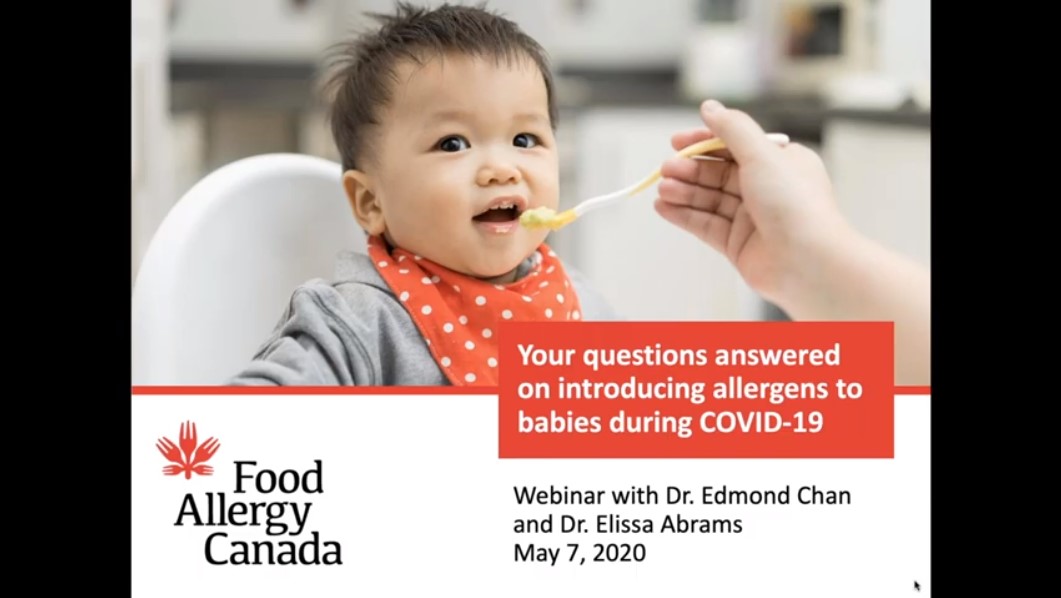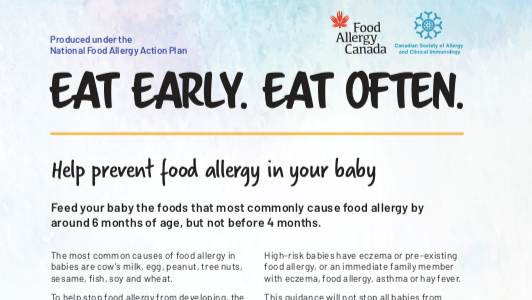Help #MakeFoodAllergyCount by writing to your MP before January 25th and read about one family’s experience reaching out to their MP. Learn what’s new in food allergy research, including a study on eating peanut while breastfeeding and introducing peanut early, and participate in an important research study on the psychological health needs of living with food allergy. Plus, check out our latest mythbuster on whether those with fish allergy should avoid all seafood.
Help #MakeFoodAllergyCount: Write to your MP before January 25th

The House of Commons will reconvene on January 25th, 2021 and the Standing Committee on Finance will soon resume their discussions and considerations for the 2021 federal budget. We need your help to ensure food allergy is on their agenda!
As MPs are currently in their home ridings, it provides an opportunity for them to hear from you, their constituents, on matters that are important to you.
Please reach out to your local MP today and ask them to support our 2021 pre-budget submission. In our letter template below, we have included the email addresses for the Minister of Finance, Minister of Health, and the Chair of the Finance Committee to ensure they hear directly from you as well.
Your voice helps to make our advocacy stronger. The budget we are seeking will help us act on the key initiatives outlined in our National Food Allergy Action Plan. Please do your part and to help us make food allergy a priority with the federal government.
Discover how one family helped to #MakeFoodAllergyCount with their MP
Over the past several months, we have elevated the food allergy conversation with the federal government with the help of members in our community like Pam.

Pam Isaak is a busy food allergy mom and leader of the Niagara Food Allergy Parents Support Group. Last fall, she decided to get involved in our advocacy campaign to help #MakeFoodAllergyCount by sharing her family’s food allergy story with her Member of Parliament (MP).
Check out our interview with Pam to learn about her successful experience speaking with her MP and get inspired to help drive real change by writing to your MP.
“My MP was very clear; if as a community we wish to make food allergy a topic of conversation, then it is critical for many individuals and families all over Canada to speak to their MPs. As he said to me, ‘I will mention this to our health minister and she will listen, thus putting it on her radar. But can you imagine the impact it will have on her if ten MPs come to her with the same message? The more voices on this issue, the greater interest she will have in this issue.'”
Pam Isaak, food allergy mom and support group leader
Research: Mothers eating peanut, breastfeeding, and introducing peanut early may reduce the risk of peanut allergy in children

A Canadian study finds that eating peanuts while breastfeeding, combined with introducing peanuts to babies in their first year, may reduce a child’s risk of peanut allergy by age five. For this study, the relationship between maternal peanut consumption, breastfeeding, and infant peanut consumption, in the development of peanut sensitization, were examined.
Results showed that infants who were fed peanut before one year of age had a 66% reduced risk of peanut sensitization at age 5 compared to those who were not. With the “triple exposure”, where mothers introduced peanut early while breastfeeding and consumed peanut themselves, the difference was even more significant (88% reduced risk).
The research findings “support guidelines recommending early peanut introduction for allergy prevention and contribute new evidence that maternal peanut consumption and breastfeeding could further enhance this protective effect.”
For more information, read the press release.
For information about early introduction, check our web page, watch our webinar on introducing allergens to babies during COVID-19, download our parent resource with practical ways and recipes for introducing allergens early, and read the Canadian Paediatric Society’s (CPS) recommendations on early introduction during the pandemic.
Research: Participate in a survey on the psychological health needs of living with food allergy and access to care
An international study, by researchers in Europe, Canada, and the U.S., is looking at the psychological health needs, including stress, worry, anxiety and depression, related to living with food allergy, and access to care.
If you have a food allergy or are a parent of a child with food allergy, you are invited to participate in this study. If you’ve already completed the survey, thank you!
How to participate
You’ll be asked to take an online survey, which will take 20-30 minutes to complete. To participate, you or your child must have a food allergy diagnosis by a medical doctor.
Take the youth survey if you are 12-17
Your participation in this study is vital to providing the researchers with insights on the psychological health care needs of patients with food allergy and their families, and the services being offered. It will also help patient organizations like ours advocate for greater mental health supports.
Mythbuster – If someone has a fish allergy, should they avoid all seafood?

FACT: Fish (e.g., trout, salmon), crustaceans (e.g., lobster, shrimp), and molluscs (e.g., scallops, clams) are sometimes collectively referred to as seafood. People allergic to one type of seafood may not be allergic to other kinds of seafood. For example, some people can eat lobster or clams but not fish. It is also possible to be allergic to some types of fish but not others. If you are allergic to one type of seafood, talk to your allergist before you consider eating other types.
Learn more about these priority food allergens
Help us educate your communities and share this mythbuster with them! Find more mythbusters at foodallergycanada.ca/mythbusters.
Tags: advocacy, mythbuster, Research







